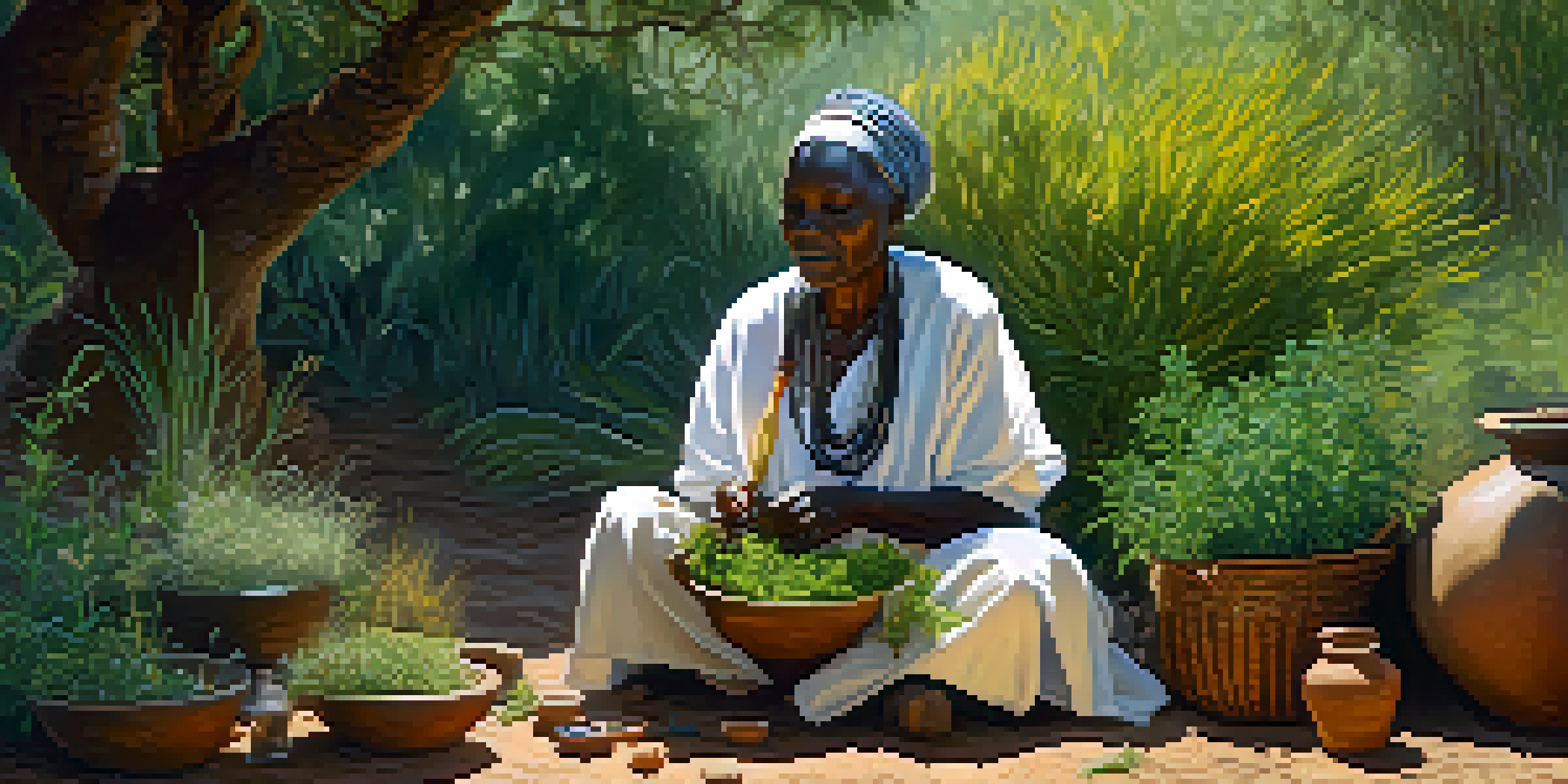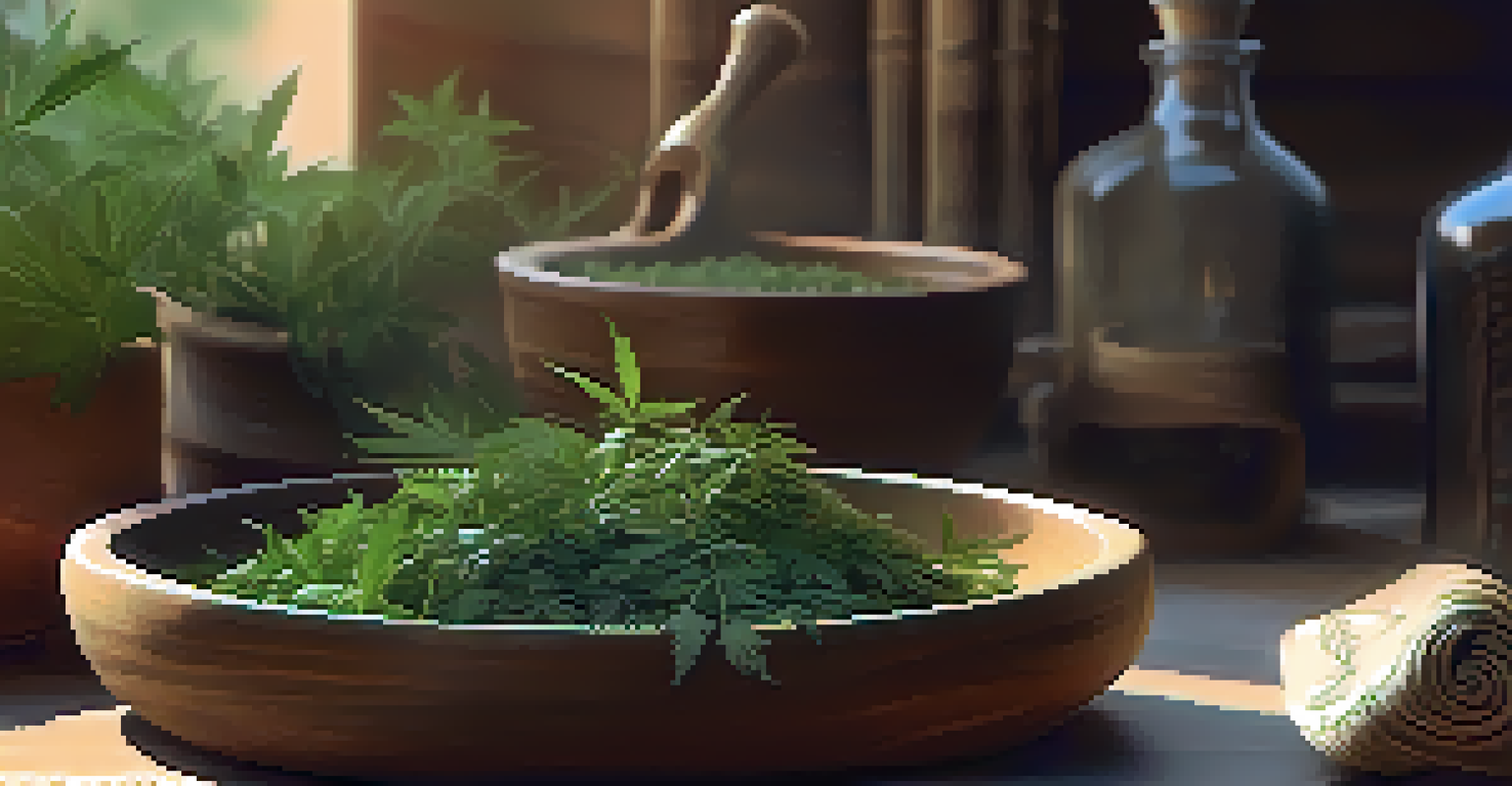Comparing Marijuana Use in Traditional African Medicine

Understanding Traditional African Medicine Practices
Traditional African medicine encompasses a variety of healing practices that have been passed down through generations. It typically involves the use of herbal remedies, rituals, and spiritual guidance tailored to the individual’s needs. This holistic approach focuses on balancing the body, mind, and spirit, often integrating community and cultural beliefs into the healing process.
In traditional African societies, health is seen as a collective responsibility, and healing practices reflect the cultural identity of the community.
Many African communities view health as a collective responsibility, emphasizing the role of the community healer or herbalist. These practitioners often hold a deep understanding of local plants and their medicinal properties, using them to treat various ailments. This knowledge is not only practical but also woven into the fabric of cultural identity, making it essential for the preservation of traditional practices.
Marijuana, or cannabis, has been part of this rich tapestry, often used for its therapeutic effects. It’s important to understand how these traditional methods have evolved, especially as modern medicine continues to influence practices and perceptions of marijuana's role in healing.
Historical Context of Marijuana in African Healing
Marijuana has a long history in various African cultures, often used for both medicinal and ritualistic purposes. Historical records suggest that its use dates back hundreds, if not thousands, of years, with some tribes employing it in spiritual ceremonies to connect with ancestors or deities. This ancient utilization highlights the plant's significance beyond mere medicinal properties.

In many societies, marijuana is believed to possess properties that promote relaxation, alleviate pain, and encourage mental clarity. Healers often prescribe it to treat conditions like anxiety, chronic pain, and even as an aid for spiritual journeys. The integration of marijuana into these practices illustrates a deep-rooted respect for the plant and its effects on both physical and spiritual well-being.
Marijuana's Role in Healing
Marijuana has been used in traditional African medicine for centuries, providing relief for various ailments and integrating spiritual practices.
As colonial influences spread across the continent, marijuana's perception shifted, often being labeled as a 'dangerous drug.' However, many traditional healers continued to use it, blending ancient wisdom with modern challenges while advocating for its benefits in the healing process.
Current Trends in Marijuana Use in African Cultures
Today, there is a noticeable resurgence in the acceptance and use of marijuana within traditional African medicine. As more people become aware of its potential health benefits, communities are revisiting age-old practices that incorporate cannabis. This trend is supported by a growing body of research highlighting its medicinal properties, further legitimizing its role in healing.
The integration of ancient wisdom with modern science is essential for the future of traditional healing practices, especially in the context of cannabis.
Some African nations have begun to legalize or decriminalize marijuana, prompting a renewed interest in its cultivation and use. This shift not only reflects changing societal attitudes but also opens up opportunities for economic growth through the establishment of legal cannabis markets. Local farmers and healers are increasingly finding ways to incorporate marijuana into their practices while complying with new regulations.
However, this resurgence also brings challenges, including the need to balance traditional knowledge with modern scientific research. Ensuring that the use of marijuana aligns with cultural values and respects historical practices is crucial as communities navigate this changing landscape.
Medicinal Benefits of Marijuana in African Herbal Remedies
Marijuana is renowned for its wide array of medicinal benefits, particularly in the context of traditional African medicine. It is often used to alleviate symptoms of various ailments, such as chronic pain, inflammation, and mental health disorders. The compounds found in marijuana, particularly cannabinoids like CBD and THC, are believed to interact with the human body's endocannabinoid system, promoting healing.
In many cultures, marijuana is combined with other local herbs to enhance its therapeutic effects. For instance, traditional healers might create potent mixtures that leverage the complementary properties of different plants. This practice not only showcases the versatility of marijuana but also highlights the importance of holistic treatment approaches in traditional medicine.
Cultural Significance of Cannabis
Beyond medicinal uses, marijuana serves as a symbol of unity and creativity in many African societies, enhancing social bonds and cultural expressions.
Additionally, anecdotal evidence from various communities supports the idea that marijuana can aid in the treatment of conditions like epilepsy or insomnia. As research continues to explore these claims, marijuana's integration into African herbal remedies is likely to gain further appreciation and understanding.
Cultural Significance of Marijuana in African Societies
Beyond its medicinal uses, marijuana holds significant cultural importance in many African societies. It is often utilized in traditional rituals, celebrations, and gatherings, symbolizing unity and community bonding. The act of sharing marijuana among friends or family can foster connections, making it a social lubricant that strengthens relationships.
In some cultures, marijuana is also linked to artistic expression, with musicians and dancers incorporating its use into their performances. This connection to creativity highlights how marijuana is woven into the cultural fabric, serving as a source of inspiration and communal joy. The plant’s role in these contexts underscores its multifaceted nature, encompassing both healing and celebration.
Understanding these cultural dimensions is essential when discussing marijuana’s place in traditional African medicine. It’s not just about the plant itself; it’s about the stories, traditions, and communal practices that have evolved around its use.
Challenges Facing the Integration of Marijuana in Medicine
Despite its rich history and emerging acceptance, there are still significant challenges facing the integration of marijuana into traditional African medicine. One major hurdle is the stigma that surrounds its use, often rooted in colonial-era perceptions of marijuana as a 'dangerous drug.' Overcoming this stigma requires education and advocacy to highlight the benefits and cultural significance of the plant.
Additionally, regulatory frameworks in many African countries are still evolving, leading to uncertainty for traditional healers and practitioners. The lack of clear guidelines can hinder the ability to utilize marijuana legally, making it difficult for healers to incorporate it into their practices without fear of legal repercussions. This regulatory ambiguity can stifle innovation and limit the potential benefits of marijuana in healing.
Challenges in Legal Integration
Despite its historical significance, the integration of marijuana into traditional medicine faces challenges, including stigma and evolving regulations.
Furthermore, there is an ongoing need for research to validate the medicinal claims surrounding marijuana use. Collaborations between traditional healers and scientific researchers are crucial to bridge the gap between traditional knowledge and contemporary medicine, ensuring that marijuana can be utilized safely and effectively in African healing practices.
The Future of Marijuana in Traditional African Medicine
Looking ahead, the future of marijuana in traditional African medicine appears promising, albeit complex. As conversations around cannabis continue to evolve globally, African nations are uniquely positioned to blend traditional knowledge with modern scientific insights. This synthesis has the potential to create robust healing practices that respect cultural heritage while leveraging contemporary research.
Moreover, as more countries consider legalizing marijuana for medical use, there is an opportunity for traditional healers to play a pivotal role in shaping regulations and practices. Engaging these practitioners in discussions about the use of marijuana can ensure that policies reflect the cultural values and historical significance of the plant.

Ultimately, the future of marijuana in African medicine hinges on collaboration, education, and respect for tradition. By fostering an open dialogue that embraces both ancient wisdom and modern science, communities can navigate the evolving landscape of marijuana use while honoring their rich cultural heritage.